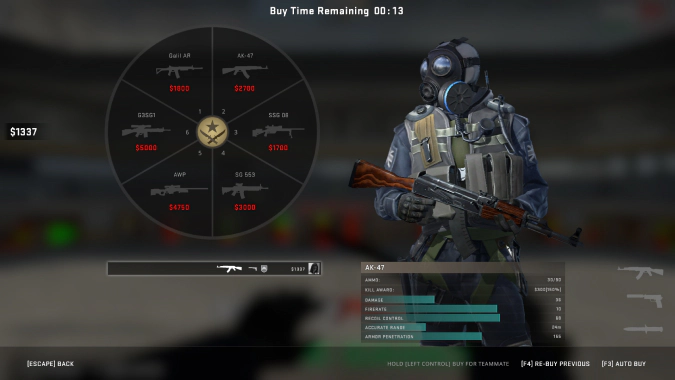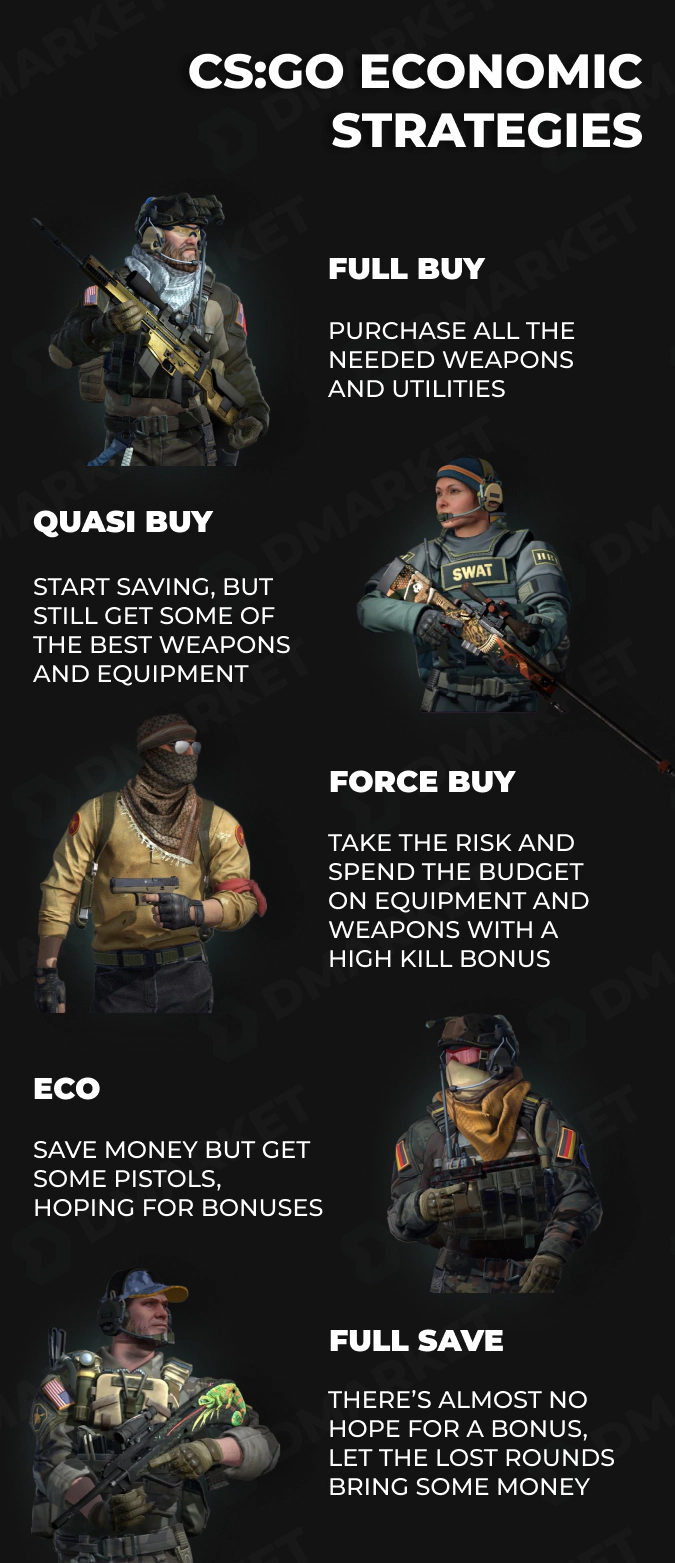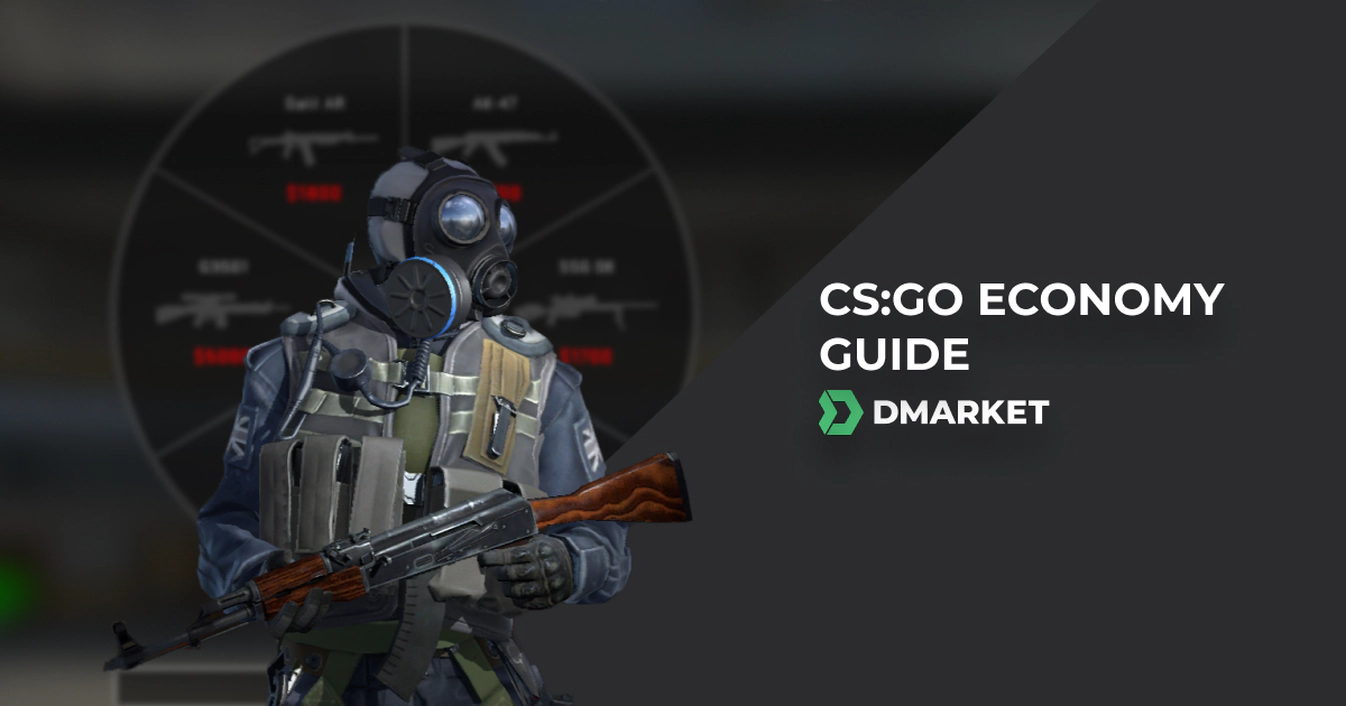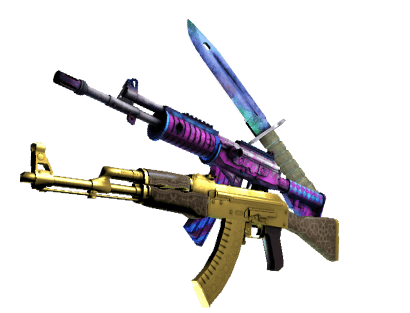All You Need to Know About CS:GO Economy
Counter-Strike has many layers. On the surface, players have fun running around the virtual maps, shooting almost randomly. The deeper you go, the trickier aspects become obvious. You need to plan your individual actions and be in perfect harmony with the whole team. And then, moving one step further, you need to become an expert in CS:GO economy. It’s essential for your general success in the game, and becoming significantly closer to pro level.
The topic of spending money on weapons and earning it in rounds is not difficult — if you use a proper approach. This CS:GO guide will help you understand the basics and develop the skill of building your economic strategy.
Don’t confuse the internal economy with the real-cash business of CS:GO skins. You are already in the right place to sell stuff from your inventory or purchase something new and awesome! DMarket has many convenient options. For example, you can exchange your skins on our marketplace to create a great collection and express your unique style.
CS:GO Economy Explained: The Basics
So, first things first — let’s figure out how the whole system works in general.
Every player starts a CS:GO match with a specific amount: $800. Successful actions, such as kills or planting/defusing a bomb, generate money. Losses are also profitable, and even with a lost round teams get something to their account, but the sum is significantly smaller.
The general formula is: the more successful your team is from round to round, the more money it has. And therefore, you and your teammates have funds to make effective purchases (if necessary) and have even more victorious rounds.
Part of the money is earned by the whole team and divided between the players: wins/losses and bomb planting/defusing. And some is strictly individual: the kill bonus, which depends on the weapon. Each player can have up to $16,000 in their “pocket”.
In the very first round, the game only allows you to buy pistols and equipment. Results of the pistol round dictate your economic actions — whether you have funds for the best guns or if you should save money and try to earn as much as possible with the low-cost/high-reward weapon type. Then, deep into the match, you make similar decisions after each and every round. The strategy might be based on spending everything with the risk of losing it. Or you may decide to save what you have for a powerful strike in a couple of rounds. The current match score and the number of remaining rounds directly affect these economic decisions. Your opponents’ money is also a significant factor.
The whole concept is pretty simple, but as is usual with competitive gaming, only practice can transform knowledge into skills. Our CS:GO economy guide lists direct steps for you to avoid going astray in this journey.
Economy of CS:GO Step by Step
It’s a good idea to divide a massive amount of information into smaller pieces and connect them into a logical chain. Let’s do this with the CS:GO economy!
1. Learn Buy Menu and Prices
Those 30 seconds you have before a round are not the time for surfing the purchase interface and looking for something you could buy. Your brain should be busy answering “What do we need right now?”, not “Where’s that M4A4?” or “Is that enough for AWP?”

Take your time to explore the menu without the pressure of being in the middle of a match. For example, you can practice with bots and focus on weapon purchases. Make the opponents less skilled or use other settings through various CS:GO bot commands to decrease the tension but still keep the process interesting.
You also might consider using CS console commands that directly affect the buying process:
-
mp_buytime 30 — set the value in seconds to have more time in the buy menu.
-
mp_buy_anywhere 1 — activate this option (with the value 1) to have access to the “shop” anywhere on the map. The value 0 returns you to the default setting.
Combine the buy menu learning with memorizing the prices. You should be able to see the money on your account directly as weapon possibilities. “I have this amount, so I’ll buy that gun.”
It’s ok to feel overwhelmed with numbers at the beginning. In general, you don’t need to remember every single price. Direct your attention to the weapons you personally use most of the time.
And again, let us remind you that in-game prices are a totally different topic to skin prices. More information on what affects the economy of cosmetic in-game items can be found in our CS:GO float guide.
| Type | Terrorist Weapons | Counter-Terrorist Weapons | Price |
|---|---|---|---|
| Pistols | Glock-18 | USP-S/P2000 | $200 |
| Dual Berettas | $300 | ||
| P250 | $300 | ||
| Tec-9/CZ75-Auto | Five-SeveN/CZ75-Auto | $500 | |
| Desert Eagle/R8 Revolver | $700/600 | ||
| Heavy |
Nova | $1050 | |
| XM1014 | $2000 | ||
| Sawed-Off | MAG-7 | $1100/1300 | |
| M249 | $5200 | ||
| Negev | $1700 | ||
| SMG | MAC-10 | MP9 | $1050/$1250 |
| MP7/MP5-SD | $1500 | ||
| UMP-45 | $1200 | ||
| P90 | $2350 | ||
| PP-Bizon | $1400 | ||
Rifles |
Galil-AR | FAMAS | $1800/2050 |
| AK-47 | M4A4/M4A1-S | $2700/3100/2900 | |
| SSG 08 | $1700 | ||
| SG 553 | AUG | $3000/3300 | |
| AWP | $4750 | ||
| G3SG1 | SCAR-20 | $5000 | |
2. Develop Your Understanding of the Most Profitable Actions in a Round
The next step to take is to figure out what brings cash for your team. As our CS:GO economy guide mentions, there are two possibilities here: team actions and personal effort.
First of all, when your team wins, you don’t need to bother yourself with personal kill bonuses for different weapons. Eliminate terrorists and defuse the bomb — if you play for CT. Plant the bomb and get rid of those annoying counter-terrorists — if you play for T. Your main focus should be on winning rounds, and that will be the best economic strategy.
Win and Loss Bonuses for Counter-Terrorists
| Round after reset | Win | Bomb detonate | Total | Loss | Bomb plant | Total |
|---|---|---|---|---|---|---|
| First round | $3250 | $250 | $3500 | $1400 | N/A | $1400 |
| Second round | $3250 | $250 | $3500 | $1900 | N/A | $1900 |
| Third round | $3250 | $250 | $3500 | $2400 | N/A | $2400 |
| Fourth round | $3250 | $250 | $3500 | $2900 | N/A | $2900 |
| Fifth round | $3250 | $250 | $3500 | $3400 | N/A | $3400 |
Win and Loss Bonuses for Terrorists
| Round after reset | Win | Bomb detonate | Total | Loss | Bomb plant | Total |
|---|---|---|---|---|---|---|
| First round | $3250 | $250 | $3500 | $1400 | $800 | $2200 |
| Second round | $3250 | $250 | $3500 | $1900 | $800 | $2700 |
| Third round | $3250 | $250 | $3500 | $2400 | $800 | $3200 |
| Fourth round | $3250 | $250 | $3500 | $2900 | $800 | $3700 |
| Fifth round | $3250 | $250 | $3500 | $3400 | $800 | $4200 |
Alas, it is impossible to avoid disastrous rounds. Even great champions have been in situations when their opponents had some very successful rounds, and their team budget was drained to almost zero. It’s the point when you should switch the focus to the most profitable actions.
CS:GO weapons have different kill bonuses. Quite often, the most difficult kills give the biggest rewards, so you should take into account your actual skills. Don’t buy a weapon just because a potential kill brings a fortune. Take that gun you know how to play with. It would be a very good idea to train with different profitable guns in the matches vs bots and be prepared for real multiplayer challenges. Check out which weapons are considered to be the best for beginners.
We recommend you take a look at kill rewards for each weapon type in the game.
| Galil AR | $300 | MP9 | $600 |
|---|---|---|---|
| FAMAS | $300 | PP-Bizon | $600 |
| AK-47 | $300 | MP7 | $600 |
| M4A4 | $300 | UMP-45 | $600 |
| M4A1-S | $300 | P90 | $300 |
| SG 553 | $300 | Sawed-Off | $900 |
| AUG | $300 | MAG-7 | $900 |
| G3SG 1 | $300 | Nova | $900 |
| SCAR-20 | $300 | XM 1014 | $900 |
| SSG 08 | $300 | M249 | $300 |
| AWP | $100 | Negev | $300 |
| Glock-18 | $300 | Decoy | $300 |
| USP-S | $300 | Flashbang | $300 |
| P2000 | $300 | Smoke | $300 |
| P250 | $300 | HE | $300 |
| CZ75-Auto | $100 | Molotov Cocktail | $300 |
| Five-Seven | $300 | Incendiary | $300 |
| Tec-9 | $300 | Kelvar Vest | - |
| Dual Berettas | $300 | Kelvar + Helmet | - |
| Desert Eagle | $300 | Zeus x27 | - |
| R8 Revolver | $300 | Knife | $1,500 |
| MAC-10 | $600 | Defuse Kit | - |
3. Learn How to Save Money
There are a few economic strategies for CS:GO rounds. Not only do they depend on the sum on your account but also on your plans for the rest of the match and your appetite for risk.

-
Full Buy — it’s an ideal situation when you have enough funds to purchase everything needed for your team. Every player has their perfect weapon and all the equipment. The deal is costly, and if you die in the round, you lose everything and might not have the resources to repeat the Full Buy strategy in the next round. That’s why it’s safer to use Full Buy when you still have some reserve after it. The risk might also be reasonable as you have effective means to succeed.
-
Quasi Buy — your team still has funds but can’t afford Full Buy or doesn’t want to risk it. Teammates should divide their roles in such a situation. Someone gets a rifle and armor. Someone invests in SMGs for higher kill bonuses. And someone might even take better pistols to keep the money for the next rounds.
-
Force Buy — when your team has trouble with its money balance (for example, you lose everything after Full Buy), you can take risks and put your money on the most rewarding weapons. The guns for Force Buy are often SMGs, as they are not too expensive but still give you real winning chances. Depending on your preferences, you might be interested in purchasing better-than-default pistols. The outcome of such a strategy totally depends on your success. After winning Force Buy, you might “update” your CS:GO economy strategy to Full Buy. But losing such a round will force you to downgrade to Eco/Full Save and stay there for longer.
-
Eco — the choice when your budget is destroyed, but you still hope to earn more than the losing round bonus. For an Eco round, players purchase pistols and probably some utilities (grenades). It’s ok to just lose Ecos without any additional bonus. But still, every kill here is super-rewarding. The history of CS:GO esports features examples where teams have won an Eco round and turned the match to their favor.
-
Full Save — this is a pretty desperate strategy, so use it only as a last resort, when even an Eco round is not an option. You buy literally nothing, so the chance of getting any bonus is rather illusionary. Still, Full Save is not a disaster, and the team has a chance to recover (it mainly depends on the general situation in this particular match).
As a game, CS:GO is awesome because of its strategic freedom. You have different economic scenarios for the rounds, and you shuffle them to build your successful match strategy. This aspect is worth discussing within the team to coordinate your actions. Esports professionals have trainers to be their economic mastermind. In amateur teams, one of the players can take this role.
There are a couple of final thoughts to add to the CS:GO economy guide. First — you should never think as an individual unit. Like with everything in the game, you are part of the team, and your money is the team’s money. Sometimes, you need to restrain yourself from purchasing your best weapon to let the other guys play their role. And sometimes, you need to buy the best weapon for someone else — for example, AWP for a better sniper.
And our final thought: never forget that keeping your weapon from round to round is part of the CS:GO economy. Keep your character alive even in disastrous rounds. The idea to run away and avoid hopeless fights is pretty beneficial.
It might not be enough to just understand the basics to succeed in the economic aspect of Counter-Strike: Global Offensive. Regular practice is needed to be ready for ever-changing match situations and coin perfect solutions for your team. Knowledge is a tool, and victories depend on how you use it. Something similar can be said about the best CPU for gaming — hardware removes obstacles, but only your effort can pave the path to many wins.
Trade on the go - install the mobile app of DMarket from Google Play or App Store. Never miss great prices and unique skins. The best CS:GO, Dota 2, Rust and TF2 marketplace is always at hand!


To not miss out on other CS:GO guides, follow DMarket on Facebook and Twitter.






















